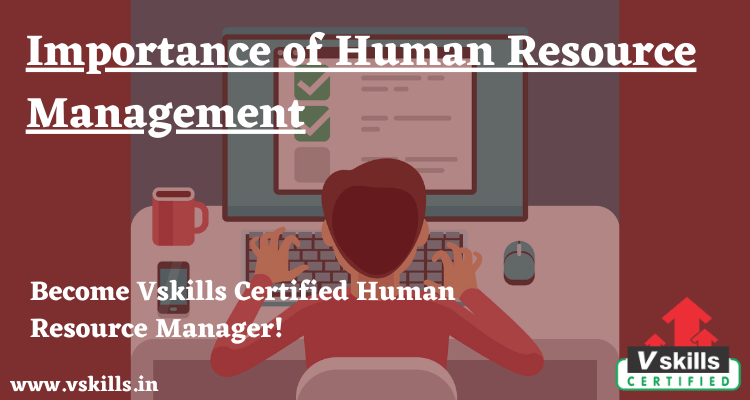Importance of Human Resource Management- Human resource management is a critical function within an organization that is responsible for managing the workforce. It plays an essential role in the success of the company by ensuring that the right people are hired, trained, and retained. Human Resource Management forms an important component of any organization as, organizations are formed, run and serve humans who interfaces as employees (whether senior management or juniors) or as the end-user of company’s products or services. Hence, a productive and motivated workforce not only results in improved customer relations but also affects the company’s bottom line.
The importance of HRM can be seen in the following ways:
- Recruitment and Selection: HRM is responsible for recruiting and selecting the right candidates for the organization. This ensures that the organization has the necessary skills and talents to achieve its objectives.
- Training and Development: HRM ensures that employees are equipped with the necessary knowledge and skills to perform their jobs effectively. This leads to increased productivity and efficiency.
- Performance Management: HRM is responsible for setting performance goals and measuring employee performance. This helps to identify areas where employees need improvement and provide feedback for their development.
- Compensation and Benefits: HRM ensures that employees are paid fairly and provided with benefits that align with their job responsibilities. This helps to retain employees and increase their job satisfaction.
- Employee Relations: HRM manages employee relations and ensures that employees are treated fairly and equitably. This helps to maintain a positive work environment and reduce employee turnover.
Due to this influence, companies and HRM invest a good share of their efforts and monetary resources for providing an employee-friendly environment in the offices by providing employee welfare activities like restrooms, creches, etc. providing paid leaves during marriage or childbirth, giving paid sabbaticals, etc.
HRM functions are crucial to the organization and because of which HRM plays an important role in enterprise strategy for achievement of it’s mission and goal. Various functions comprise of following:
- HR planning and control
- Resource allocation
- conflict resolution
- Settlement of legal claims
Of all the assets an organization has, it is the human asset which can never depreciate in value in the balance sheet, amongst other assets such as land, plant, building and equipments that fetch less value upon usage.
As an employee gains knowledge and experience over the years, he or she becomes more valuable to the organization. Today, the Human Resource department merely focuses more on the transactions, but the manpower. Yes, strategic human resource management today looks much beyond the regular data entries, filing and such other monotonous job activities. It is largely focused on cross-cultural issues, corporate cultural change, and on the rise of developing countries. Multinational corporations, for instance, may have their payroll systems in India and their IT services in developed countries, such as China. It is imperative for employees to work together, from various parts of the world. In such cases, cross-cultural issues like the management of expatriates and that of their families arise. Talking about corporate culture change, strategic human resource management is the pillar strength for corporate culture change. Where an organization needs to be as cost-effective as it could by cutting down on business expenditure and manufacturing products at the lowest possible cost and yet offering the consumers the best products at affordable rates, it also needs to compete with other companies in different parts of the world in order to survive in this highly intensive competitive environment.
The change of consumer mindset influences the corporate culture change. The purchasing power of the consumer can never be ignored, whether the consumer lives in India, China or any other developing country. This is why the organization tends to change its business plan and become multinational. Such development poses a challenge to strategic human resource management.
Practice Questions
Q1. Which of the following is NOT a responsibility of Human Resource Management?
a. Recruitment and Selection
b. Training and Development
c. Sales and Marketing
d. Performance Management
Correct Answer: c. Sales and Marketing
Q2. What is the importance of HRM?
a. Increased productivity and efficiency
b. Retention of employees
c. Positive work environment
d. All of the above
Correct Answer: d. All of the above
Q3. Which of the following is a function of HRM?
a. Accounting and Finance
b. Procurement and Supply Chain Management
c. Performance Management
d. Operations Management
Correct Answer: c. Performance Management
Q4. What is the primary goal of performance management in HRM?
A. To evaluate employee performance
B. To provide feedback for improvement
C. To recognize excellent performance
D. All of the above
Correct Answer: D. All of the above
Q5. Which HRM function ensures that the organization complies with employment laws and regulations?
A. Recruitment and Selection
B. Training and Development
C. Employee Relations
D. Compliance
Correct Answer: D. Compliance



